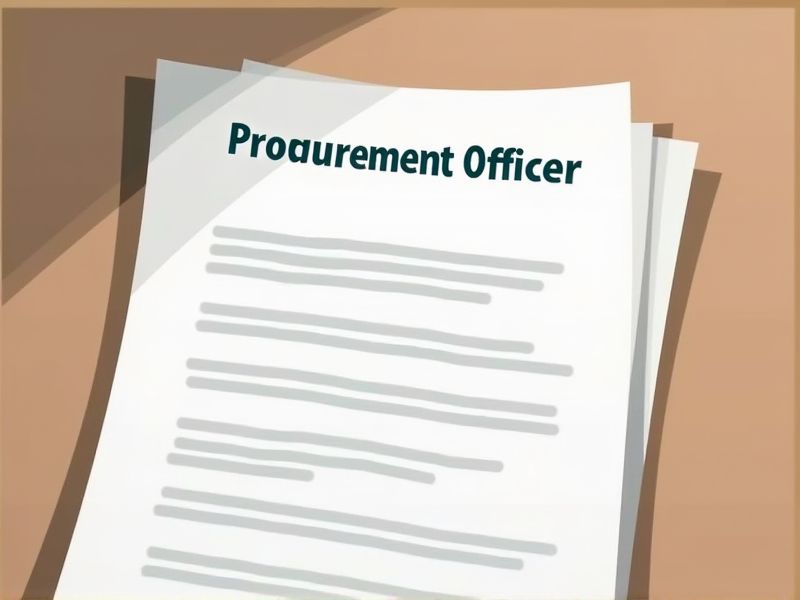
The role of a Procurement Officer involves managing complex supply chains and negotiating contracts, which requires a deep understanding of market dynamics. Certifications in procurement provide the necessary frameworks and methodologies to ensure compliance with industry standards. They also offer expertise in cost-saving strategies and vendor management. Important certifications you may need for a Procurement Officer include CPOS, CPSM, or CIPS.
Certified Professional in Supply Management (CPSM)
The CPSM certification enhances a procurement officer's credibility and demonstrates mastery in supply management, which often leads to increased career opportunities and salary potential. By earning the CPSM, professionals gain recognition for their expertise in areas such as risk management, cost analysis, and supplier relationship management. The rigorous training involved in CPSM equips procurement officers with the skills needed to improve operational efficiencies and reduce costs. Having CPSM certification also ensures that procurement professionals stay up-to-date with the latest industry trends and best practices.
Certified Public Procurement Officer (CPPO)
Having a Certified Public Procurement Officer (CPPO) ensures that procurement processes align with established standards and legal requirements. This certification enhances the credibility and trustworthiness of the procurement officer's decisions, reducing risks of fraud or mismanagement. Organizations benefit from certified officers as they bring a structured and knowledgeable approach to complex purchasing activities. Furthermore, CPPOs are often equipped with advanced skills in negotiation and cost analysis, leading to more efficient and cost-effective procurement outcomes.
Certified Professional Public Buyer (CPPB)
The Certified Professional Public Buyer (CPPB) credential is needed because it aligns procurement officers with industry standards. Holding a CPPB enhances a procurement officer's credibility and reflects a verified commitment to ethical and efficient procurement practices. The certification ensures procurement officers possess critical skills and knowledge, which can lead to more informed purchasing decisions and cost savings for organizations. Many governmental and public entities prefer or require CPPB certification, facilitating career advancement and professional recognition.
Certified Supply Chain Professional (CSCP)
A Certified Supply Chain Professional (CSCP) credential enhances a Procurement Officer's understanding of global supply chain management, providing the skills needed to optimize procurement processes. Having a CSCP allows individuals to integrate supply chain operations with strategic sourcing, ultimately reducing costs and driving efficiency. This certification helps procurement officers to stay updated on best practices, leveraging data analytics for informed decision-making. Employers often prefer candidates with a CSCP because it demonstrates a commitment to professional development and knowledge of industry standards.
Certified in Logistics, Transportation and Distribution (CLTD)
Achieving the Certified in Logistics, Transportation and Distribution (CLTD) credential equips a procurement officer with an in-depth understanding of supply chain logistics, which enhances decision-making in supplier selection and relationship management. Mastery of advanced logistics concepts through CLTD would improve efficiency in inventory management and cost control strategies. This certification supports the procurement officer in adhering to compliance regulations and mitigating risks in transportation and distribution networks. Employers value the CLTD credential as it demonstrates a commitment to professional development and aligns with industry best practices.
Certified Purchasing Manager (CPM)
The role of a Certified Purchasing Manager enhances a Procurement Officer's ability to strategically evaluate suppliers, leading to more effective cost management. With CPM certification, procurement professionals gain advanced skills in contract negotiation, driving higher efficiency in securing favorable terms. Certified individuals bring a comprehensive understanding of supply chain dynamics, reducing risks of disruptions. The CPM credential signifies a commitment to ethical procurement practices, fostering trust with stakeholders and suppliers.
Certified Strategic Sourcing Professional (CSSP)
A Certified Strategic Sourcing Professional (CSSP) equips a Procurement Officer with advanced skills in identifying cost-saving opportunities, directly leading to improved financial performance for their organization. The CSSP certification provides structured knowledge on supplier relationship management, resulting in stronger and more reliable partnerships. By mastering strategic sourcing techniques through the CSSP program, procurement officers can effectively mitigate risks in the supply chain. Employers value the CSSP credential as it signifies a commitment to professional growth and operational excellence.
Lean Six Sigma Green Belt
A Lean Six Sigma Green Belt equips a Procurement Officer with the skills to identify and eliminate inefficiencies in procurement processes, leading to cost savings. It enhances the ability to analyze data-driven insights that ensure optimal supplier selection and inventory management. Mastery of these methodologies increases process standardization, reducing errors and improving supplier performance consistency. The training fosters a culture of continuous improvement, crucial for staying competitive in evolving markets.
Certified Commercial Contracts Manager (CCCM)
A Certified Commercial Contracts Manager (CCCM) ensures a procurement officer is equipped with specialized knowledge in commercial contract law and regulations. This certification enhances the procurement officer's ability to craft contracts that mitigate risk and protect organizational interests. It leads to more streamlined contract negotiations, fostering stronger supplier relationships and reducing potential disputes. Obtaining a CCCM can result in improved compliance with legal standards, ultimately supporting more efficient procurement processes.
Project Management Professional (PMP)
A Procurement Officer with PMP certification can manage project timelines and budgets more effectively, leading to cost savings. This certification enhances a Procurement Officer's ability to execute procurement strategies aligned with project goals. PMP provides tools for risk management, which is crucial in mitigating procurement-related risks. Knowledge of project management frameworks ensures procurement processes integrate seamlessly with broader organizational operations.
Summary
By obtaining certifications, you can enhance your procurement knowledge, leading to improved decision-making skills. This enhancement often results in more strategic sourcing options and cost efficiencies for your organization. The certifications also boost your credibility and career prospects within the industry. As a result, your organization can expect better supplier relationships and compliance with regulations.
